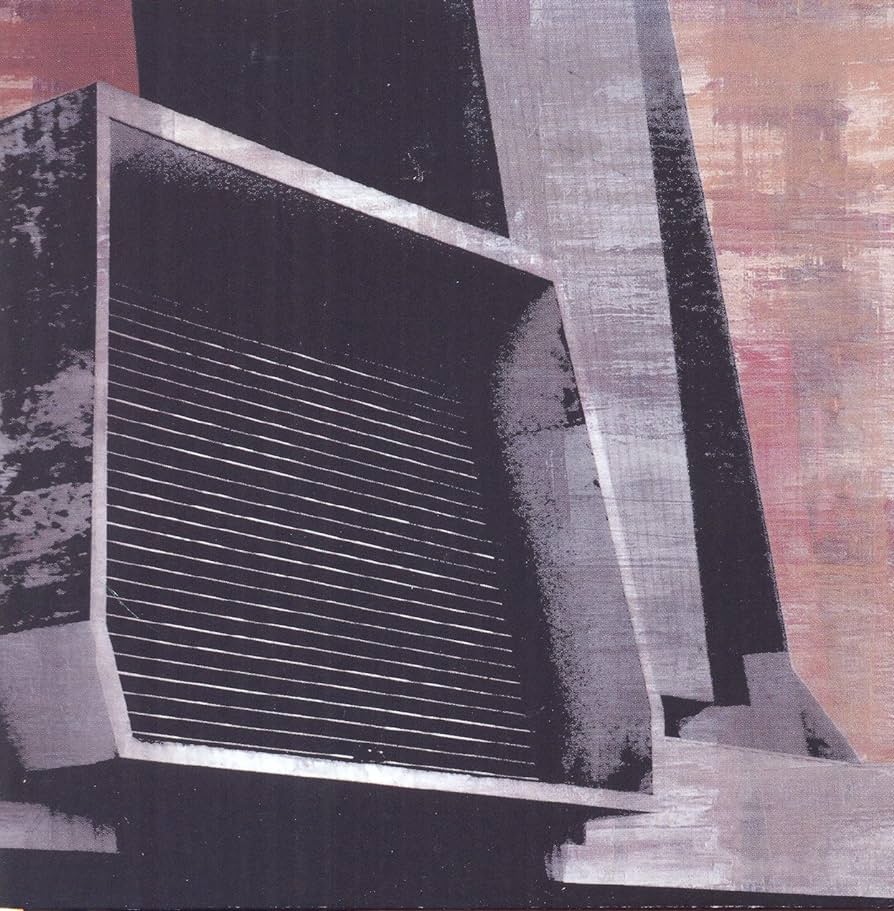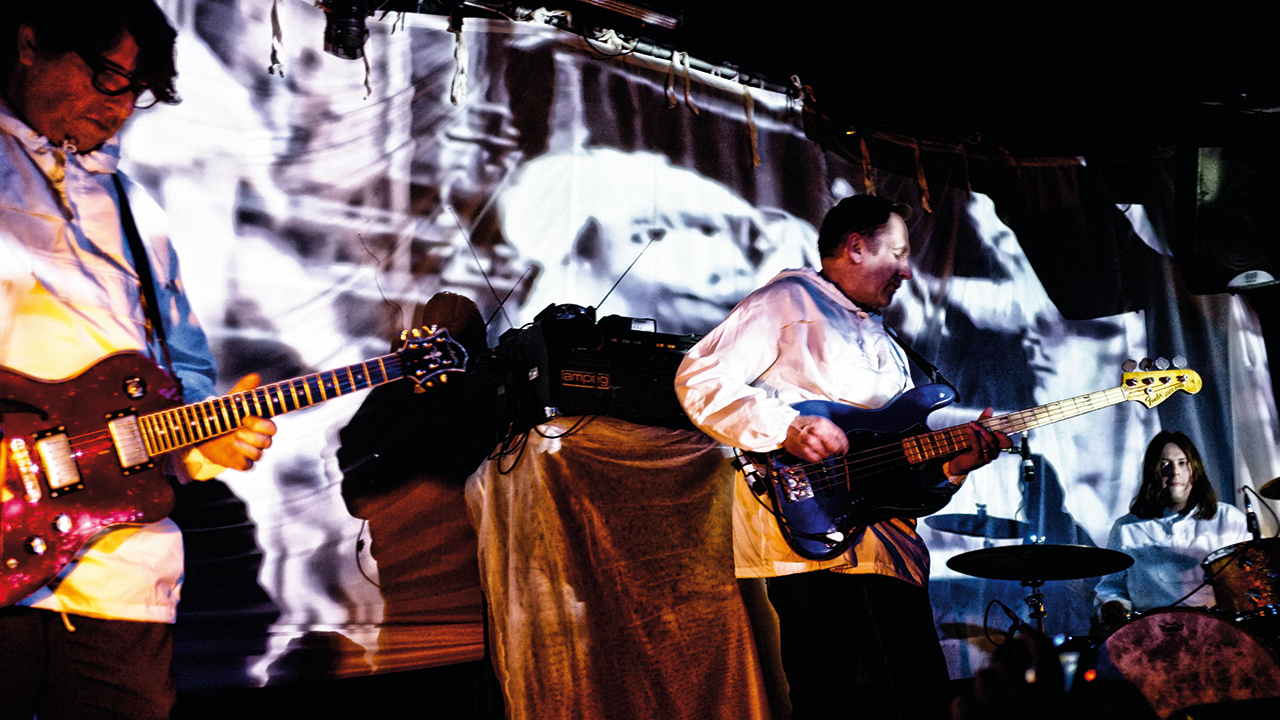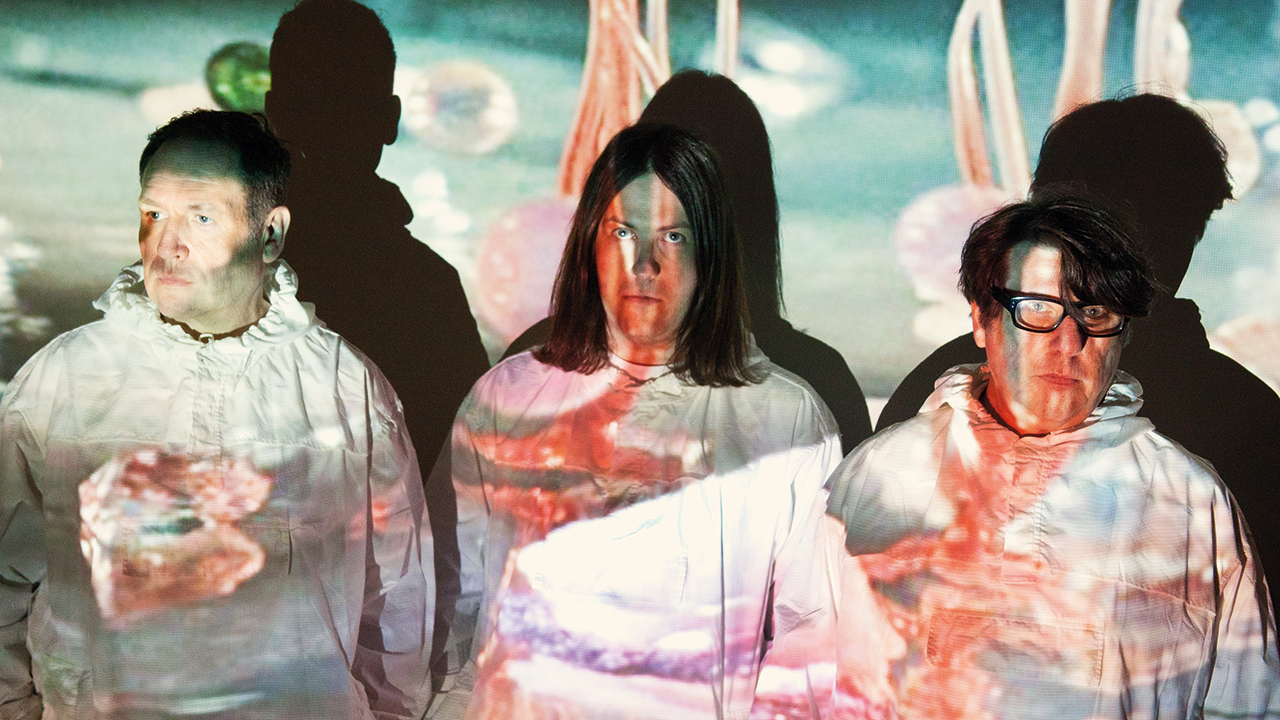Echo & The Bunnymen may have been The post-punk poster boys of the 80s, but their dowdy trenchcoats covered deceptively progressive hearts. In 2013 Prog met Bunnymen Will Sergeant and Les Pattinson look back at their old band – and reveal how their new trio Poltergeist is haunted by the spirit of prog.
Rattle off a list of prog-loving British bands and chances are that Echo & The Bunnymen won’t be on it. Forged in the vibrant Liverpool scene of the late 70s, the four-piece made their name as broody purveyors of post-punk melodrama, all chiming riffs and a frontman who styled himself somewhere between Jim Morrison and David Bowie.
Sartorially, too, they were about as far removed from prog as you could imagine: trenchcoats, duffel jackets, lots of black. Yet scratch beneath the topsoil of their Heaven Up Here and Porcupine albums, and there were discernible roots of Genesis, Floyd or even Tangerine Dream.
Guitarist Will Sergeant was chiefly responsible for these prog influences. Now
55, he's still very much a champion of the possibilities and plurality of music, something he’s exploring in thrilling detail with his latest project Poltergeist. He formed the instrumental trio with old schoolpal and Bunnymen co-founder Les Pattinson, alongside ex-Black Velvets drummer (and current Bunnyman) Nick Kilroe. Their debut album, Your Mind Is A Box (Let Us Fill It With Wonder), comes with some delicious blurb from Sergeant: “We create a form of rock music with its toes paddling in the progressive ocean foam of the 60s and 70s, and its head in the bone-dry air of the present day.”
However mischievous it all appears, Sergeant is deadly serious about his love of prog and its influence on the eight pieces that make up the album. Though he’s keen to stress that its shifting atmospherics and hallucinatory rhythms are too vast to easily define. “It’s only prog in the way of trying to take someone’s mind somewhere else,” he explains, over a pint in a beer garden near his West Lancashire base. “Prog is such a broad term. I mean, is Faust prog? And what about Can? Then you have ELP at the other end. Some of the ELP stuff is amazing, but we’re still tainted with that punk attitude, whereby prog is frowned upon. It’s all bollocks really.

"Put it this way. If I were stuck on a desert island, I wouldn’t take Never Mind The Bollocks, it'd be Meddle or Foxtrot. That kind of music keeps your brain going. I loved punk, garage and psychedelic stuff, but I always liked music I could get something else from.”
Even the band's name is significant. It’s been kept in reserve since childhood, when Sergeant and a schoolfriend began dabbling with Ouija boards and “made up a kind of pretend, imaginary band that was going to be called Poltergeist. It just fitted for this project, because it’s also a nod to the German bands that came out of the 70s.”
Sitting to his left is Pattinson, the bassist who quit the Bunnymen in 1998 to return to his first vocation, ship-building. Unsurprisingly, Poltergeist carry the unmistakable DNA of the duo’s old band – driving melodic basslines, expressive guitars, the constant flux between anguish and rapture – but at the same time it sounds utterly un-Bunnymen. Dreamer Dreams Of Spectrums and Dawn Visits The Garden Of Evil tap into the space-age freakery of Sergeant’s electronic solo work as Glide. The crucial difference here is that electric guitar is his preferred weapon of choice, be it coated in kraut-ish fuzz, exploding into sudden starbursts of noise or creating lovely peals of Mogwai-like ambience.
Pattinson, too, is on fine form. Aside from recording parts for a 2011 Wild Swans album, this is his first studio work since returning from exile. “After the Bunnymen, I needed to get away,” he says. “I turned my back on music. Then [Wild Swans leader] Paul Simpson called up, saying they needed a bass player. There was no writing involved, but it awoke something in me. So when Will asked if I’d come over and try out a few ideas, it was still there. And the same ideals that Will has, going back to when he was younger and into prog, connected with me.”
Ad hoc sessions took place in the evenings at Sergeant’s home studio, the Pod. “I didn’t know what it was going to be at first,” he admits. “One of the best things about this project was that there was no traditional structure to the music. I had a lot of half-done things on my computer, things I’d recorded and forgotten about. But I knew I fancied working with a band rather than doing a solo record, and it just seemed a logical step to get Les involved. Plus he lived round the corner, so it was a no-brainer. We’ve always been mates, even though Les left the Bunnymen 15 years ago.”
It’s immediately apparent that both men had a ball with this new enterprise. A defining feature of Your Mind Is A Box… is the palpable love of experimentation, of the physical and emotional capabilities of sound. “It was a case of seeing where this music took us,” Pattinson offers. “It was like a painting, adding different elements. Nothing was precious, everything was like walking through a secret garden. You’d do something, then suddenly see something else appear. It was so exciting, like an adventure in recording.”
Given that Sergeant is still a full-time member of the Bunnymen, alongside Ian McCulloch, is Poltergeist going to incorporate vocals at some stage? His answer is unequivocal. And one that draws a chuckle from each party: “No, never! We don’t want to get involved in any ego situation with this band.” Adds Pattinson: “To have some kind of fashionable guest singer might bring it down, whereas this music is ageless.”
The first few Poltergeist shows have so far been highly engaging. At the Kazimier in Liverpool, the music was accompanied by huge backdrops of archive film footage, from Peter Cook larking about in jester’s garb, to racers at Le Mans. The trio wore what Sergeant describes as white smocks, “so the projections would be on us and we’d become almost irrelevant. Poltergeist is all about the sound and the vision. I saw Pink Floyd many times and it’s just four bods pottering around on stage. You don’t look at them, you look at all the other stuff. That’s what I want it to be. I’m not interested in putting my foot on the monitor and doing wanky solos.”

This approach to the live arena is, of course, very prog. The idea of creating something different on stage was another overlooked facet of the Bunnymen’s 80s shows – not for them the enormodomes of this world, even when they were within reach. Instead they played decidedly un-rock venues such as Stratford’s Royal Shakespeare Theatre, or headed off on a tour of the Outer Hebrides, their route following the contours of an imaginary rabbit silhouette. Or they’d invite fans to a surreal, Bonzos-meets-Beatles jaunt across Liverpool via pushbike and ferry.
“Even when we were in the early days of the Bunnymen,” recalls Pattinson, “we were always thinking about how we could get this music to take people away from the idea of just going to a show.”
Sergeant adds: “[Our ex-manager] Bill Drummond and his mate Bill Butt did stage design at the Old Vic, so they had theatrical backgrounds. Bill Butt wasn’t a traditional lighting man, he’d just use things he found. We had this big industrial fan which he filled with smoke and, at a given point in Over The Wall, it would explode. And he did all the silhouettes and shadows moving around on stage. It was almost theatre. That song is virtually prog, anyway – it’s got about 15 solos in it. And we broke away from structure with Broke My Neck, which we improvised on the spot. Angels And Devils is like that, too.”
Still doubting Sergeant’s credentials for this magazine? Then you should also bear in mind that among his most treasured albums are Tangerine Dream’s Phaedra, Caravan’s In The Land Of Grey And Pink and the Floyd double whammy of Meddle and The Piper At The Gates Of Dawn. Even his favourite late-70s bands – Television, Pere Ubu and The Residents – were more progressive than punk.
He and Pattinson have also begun working on some new ideas for Poltergeist, and Sergeant is keen to bring aboard one of his heroes. “We were going to get Barrie Barlow from Jethro Tull to drum on this album, because we’ve been to his studio in Henley-on-Thames a few times so we know him slightly. He’s a great bloke, so at some point we’ll get him on to do some gongs or something. Just so we have a proper, bona-fide progster.”
Until the next time then. For the time being, you should just do as Poltergeist say: lean back and let them fill your mind with wonder.

